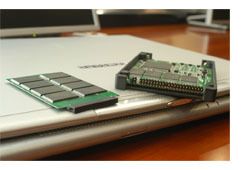Samsung develops Flash-based harddrive
San Jose (CA) - Samsung announced that it has developed the first solid state disk (SSD) based on NAND Flash memory technology. 1.8" 16 GByte SSD drives will ship in August of this year.
Using Flash for harddrives is an idea that has been around for a while. But taking advantage of low power consumption as well as fast data transfer rates usually comes at a high price. For example, M-Systems offers such harddrives with up to 176 GByte capacity and SCSI interfaces, but charges prices that reach deep into the five-figure Dollar range.
Samsung made waves in April with the announcement of a hybrid harddrive that uses the firm's NAND Flash to reduce power consumption and accelerate especially startup times of computers. The company takes this step one step further with an announcement to offer 1.8" harddrives for notebooks and Tablet PCs that are completely based on Flash and do not use any moving parts.

The company claims that the performance of the SSD exceeds the speed of other harddrives by more than 150 percent. The storage disk reads data at 57 MByte per second and writes it at up to 32 MByte per second, the company said.
The performance stays below that of M-Systems' drives (up to 320 GByte per second), but pricing should also come in significantly lower. Samsung did not comment on the cost of a SSD drive, but considering current Flash pricing we would expect the 8 GByte drive to start be positioned in $500-600 price bracket and the 16 GByte unit to ring in at about $1200.
Related stories
Hybrid harddrives to extend battery life in notebooks by 10 percent
Stay on the Cutting Edge
Join the experts who read Tom's Hardware for the inside track on enthusiast PC tech news — and have for over 25 years. We'll send breaking news and in-depth reviews of CPUs, GPUs, AI, maker hardware and more straight to your inbox.
Most Popular


